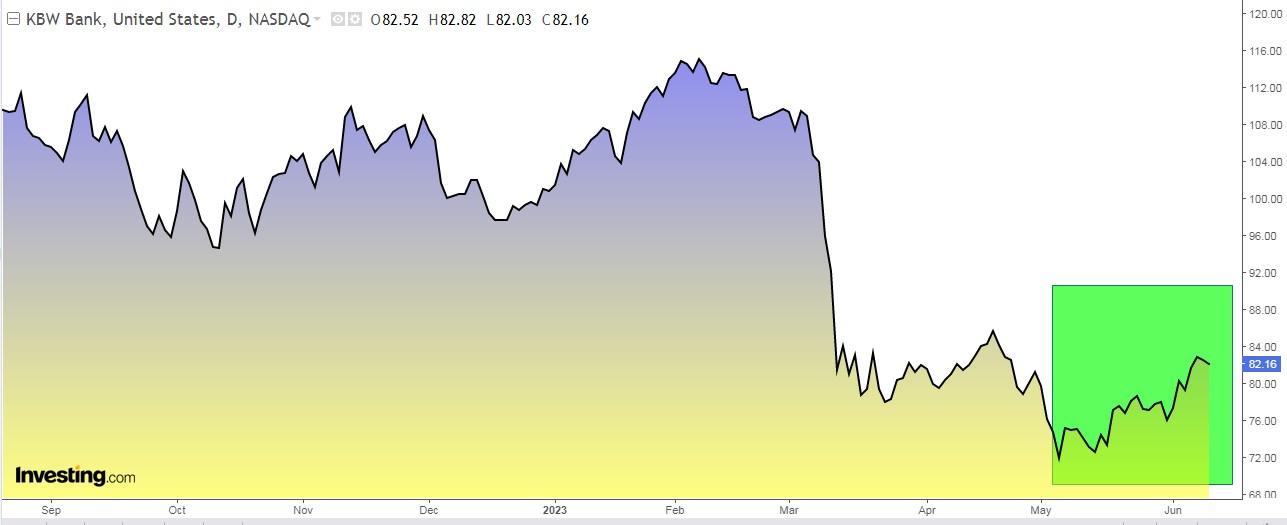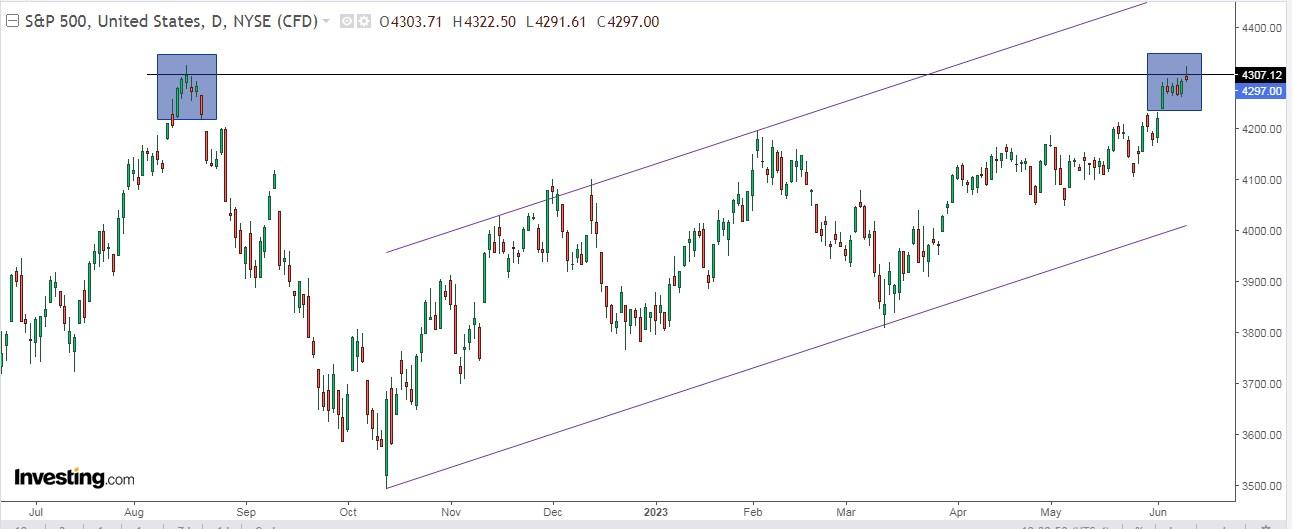4 Reasons U.S. Stock Market Could Continue to Rally
2023.06.12 09:14
- Markets face a key week ahead with the Fed and Inflation data
- Some reckon the markets will top out this week
- Despite that, bullish sentiment recently exceeded its historical average of 37.5% for the first time since February
The U.S. stock market has rallied this year, but ahead of a critical week, we’re seeing analysts talk about a potential top not far away with indexes being overbought.
The is set to decide, and we have the all-important data before that. So, could the from a top this week and head lower?
So, In this piece, we’ll choose to look at the bright side. Let’s discuss the 4 reasons the stock market could continue moving higher from here.
1. S&P 500 Has Entered Bull Market
In recent times, you have likely heard about the S&P 500’s +20% rally from its lows, which is considered an entry into a bull market.
Whether you agree or not, it’s important to consider what usually happens next in the market.
The previous bear market saw the index fall 25.4% in 282 days, a normal duration, considering the average duration of bear markets is 286 days.
The average duration of bull markets is 1,011 days. And the history is very clear on this. It turns out that when it officially entered a bull market, the performance of the S&P 500, on average, is as follows:
- 3 months later: +2.3%
- 6 months later: +10%.
- 12 months later: +17.7%.
After three months, the numbers show no significant changes. However, after six months, and particularly after a year, there is a notable trend of strong upward movement, with only one instance where the market did not experience a rise.
2. Positive First 100 Trading Days
The first 100 trading sessions of the year 2023 have already passed. During this time, the S&P 500 has risen by +8.1%.
Historical analysis reveals that when the S&P 500 rises by more than +7% in the first 100 trading days of the year, as it has done 27 times in the past 72 years (excluding the current year), it tends to perform well for the rest of the year.
On average, it has risen by +9.4% after that.
3. Regional Banks Are Staging a Comeback
Regional banks in the United States, which investors rightly abandoned a few months ago, have shown strength recently.
Over the past four weeks, their shares have been consistently rising, mirroring a similar trend observed in January. This surge in performance can be attributed to successful bond sales.
However, it’s important to note that despite these recent gains, the sector is still far from recovering the substantial losses it incurred in March.
The index, which tracks regional banks, experienced a positive growth of +4% in the past week, resulting in an overall increase of +19% over the last four weeks.

Notably, the shares of PacWest Bancorp (NASDAQ:), which experienced the largest decline among banks this year, have shown remarkable strength.
The substantial fall during 2023 has now been significantly mitigated.
The sector that lost the most faith at the beginning of the year is now starting to make a comeback. This indicates the underlying strength of the rally.
4. Market Continues to Rally Despite Relentless Selling by the Wealthy
According to a report by Capgemini, despite the strong performance of U.S. equities in 2023, wealthy investors, especially those with assets exceeding $1 million, are showing little interest in investing in stocks.
In fact, they have been selling stocks at a rate not witnessed in recent years.
So, where are they investing their capital? Surprisingly, they are opting for cash, even at levels not seen in the past 21 years.
The reason behind this trend is that they can now find savings accounts offering returns of up to +5% without having to assume or be exposed to the inherent and implicit risks associated with investing in the stock market.
However, Concentration Factor Remains a Risk
Apart from the interesting patterns we’ve just seen, there is another factor that can have both positive and negative implications for the markets in the long run.
One such factor is market concentration, where the rise of the S&P 500 this year is mainly driven by a few specific stocks. In fact, without these eight stocks, the S&P 500 would struggle to remain in positive territory for the year.
If we look at the top ten companies in the index, we find that 70% of them are technology stocks that are experiencing significant growth.
Ideally, a healthy stock index rise should involve many stocks participating in the upward movement rather than relying heavily on just a few.
Looking at the chart, we can see that the S&P 500 is currently in a bullish trend, moving within an upward channel and supported by the golden crossover (upward crossing of 20- and 50-day moving averages).
However, it’s worth noting that the index has not yet been able to break through the resistance levels.
Investor sentiment (AAII)
- Bullish sentiment, i.e., expectations that stock prices will rise over the next six months, increased 15.5 percentage points to 44.5%. This puts optimism above its historical average of 37.5% for the first time since February 2023.
- Bearish sentiment, i.e., expectations that stock prices will fall in the next six months, fell 12.5 percentage points to 24.3%. After a 15-week streak of above-average readings, bearish sentiment fell to its lowest level since November 11, 2021 (24%).
The ranking so far in 2023 of the major European and U.S. Stock Exchanges goes as follows:
- +26.68%
- Japanese +23.65%
- Italian +14.57%
- +14.55%.
- Spanish +13.13%
- +13.08%
- S&P 500 +11.96%.
- +11.42%
- +2.20%
- british +1.48%
InvestingPro tools assist savvy investors in analyzing stocks. By combining Wall Street analyst insights with comprehensive valuation models, investors can make informed decisions while maximizing their returns.
Start your InvestingPro free 7-day trial now!

Find All the Info you Need on InvestingPro!
***
Disclaimer: This article is written for informational purposes only; it is not intended to encourage the purchase of assets in any way, nor does it constitute a solicitation, offer, recommendation, advice, counseling, or recommendation to invest. We remind you that all assets are evaluated from different perspectives and are extremely risky, so the investment decision and the associated risk are the investor’s.







